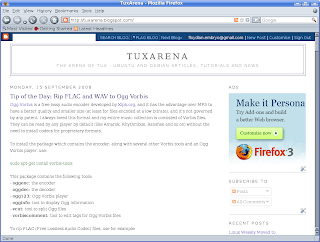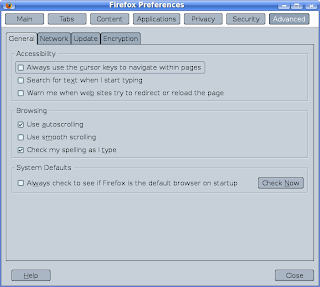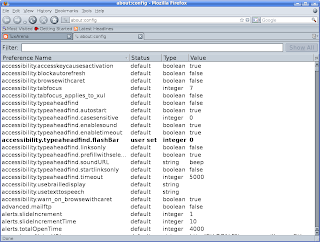Firefox 3.0.1 running on Kubuntu 8.04 Live CD

Firefox uses the Gecko layout engine (also called a rendering engine) for displaying web pages and its user interface too, by rendering XUL, an XML user interface language providing widget definitions. Gecko 1.9 is used in the last stable Firefox release. An unofficial port of Firefox using Qt instead of XUL is in the works too, and I'm very curious how development will evolve.
Compared to browsers which use different engines, like Konqueror 3.5.9 or Opera 9.52, Firefox performs better than the first when submitting or filling up certain forms, but it seems slower loading web pages than Opera. Konqueror 3.5.9 (which uses KHTML) fails miserably for example allowing you to send mails using certain forms or even writing a Blogspot post, while Firefox has no problems regarding this matter. On the other hand, despite the fact that it was praised and announced to have a lot of speed improvements, Firefox still eats more CPU and memory resources than either Konqueror or Opera, making it the slowest of them three. Although it has slow loading times and a slow interface, once loaded and in action, Firefox will prove the best tool for finishing any web-related task, also having the big advantage over Opera for being open-source.
The interface hasn't changed much compared to previous versions, like the 2.x series. It's clean, simple and intuitive, providing only the necessary toolbar buttons and most useful options via the Preferences window. A good improvement version 3 has is the address bar, which now offers clever ways of accessing the desired location, depending on how many times you accessed it and how relevant the content is compared to what you type.
It has a bookmark toolbar for fast access to your most used addresses, and provides the classic Back, Forward, Reload, Stop and Home buttons. To the right of the address bar is located the Search Engines feature, which can be accessed using CTRL+K and allows you to search by default on Google, or select another search engine, like Amazon.com or Wikipedia. Many other engines can also be installed, but I think user-defined keyword shortcuts are more useful and handy. It's a matter of preferences after all.
The Preferences window allows configuration of the most usual settings, like the default address to start with, download location, tabs configuration, appearance or security (including privacy settings, cookies, and passwords). The interface fonts can be changed using the userChrome.css file inside the Firefox directory (e.g. ~/.mozilla/firefox/RANDOM.default/chrome/userChrome.css).
Preferences - you can change the most usual settings here
 The about:config dialogue allows you to truly configure Firefox in any way possible, and you can find here all the necessary entries for tweaking Firefox the way you like it. For example, if you want to disable the finished downloads notification, all you have to do is search for the browser.download.manager.showAlertOnComplete variable and set its value to false by double clicking on it. A very comprehensive guide for each entry can be found here.
The about:config dialogue allows you to truly configure Firefox in any way possible, and you can find here all the necessary entries for tweaking Firefox the way you like it. For example, if you want to disable the finished downloads notification, all you have to do is search for the browser.download.manager.showAlertOnComplete variable and set its value to false by double clicking on it. A very comprehensive guide for each entry can be found here.The about:config entries - tweak anything related to Firefox from here

One of the great features Firefox comes with is the ability to install various add-ons and themes, and the official website contains hundreds of them, like the StumbleUpon add-on, the DownloadHelper add-on for downloading all media content from within a web page (useful especially for YouTube videos), or the Adblock Plus extension which blocks ads on pages including them. Some of the nicest themes already ported to Firefox 3 are Noia eXtreme and Phoenity Modern.
Managing bookmarks

Regarding interface speed, response and loading times, I think Firefox still remains one of the slowest browsers compared to Konqueror, Opera or Epiphany. I didn't yet have the occasion to compare it to Chrome, but since currently it's only natively available for Windows, running it through Wine shouldn't be fair.
About Firefox 3

In the end, Firefox 3 looks to be the most powerful and useful browser available for the Linux platform. Opera is a very good competitor regarding features and usability, but unfortunately it's still closed-source. All the themes, all the powerful entries in about:config, the add-ons, the bookmarks easy to manage, all these features make out of Firefox the best and the most popular web application for the Linux OS.
Related articles
5 Useful Tips to Customise Firefox 3
Updated: Sep 16, 2008
7 comments:
There is absolutely no way that firefox is slower than epiphany or konqueror, however I will say it is slower than opera. You have to remember epiphany uses the older version of gecko, which should mean slower rendering. Not only that, but depending on your window manager firefox can use less ram than opera, or konqueror.
Please read the first sentence again. Then do a Google search on "run-on sentences."
Anonymous @ 00:01, I'm not sure what are you referring too. The first sentence or the first phrase? 'Not only Firefox became in a relatively short amount of time the most popular web browser on Linux' is the first sentence, is there something wrong with it? If so, please explain, English is not my first language.
P.S. I ran into this, but it doesn't seem to be the case. Or maybe?
After reading your first sentence I could tell that English wasn't your first language, but I am prepared to cut you some slack in appreciation for you putting English content online. :)
I probably wouldn't consider your sentence a run-on sentence because it expresses a single idea, the idea that FF acheived certain things in a short period of time. Grammar nazis may be a little more picky.
However, the sentence could use some restructuring to be more readable. I would rewrite it as two sentences. e.g. "In a short period of time Firefox has become the most popular web browser for Linux. It is also the most powerful competitor to Internet Explorer proving itself to be faster, more stable, more flexible and secure."
My rewrite is far from perfect but it is more readable and conveys all that you were hoping. A grammar nazi may say that my second sentence is a run-on sentence. I say that rules can occasionally be broken if you are still able to clearly communicate with the audience. (note the split infinitive) :)
English is very difficult to learn; most native speakers have a basic grasp and very few are capable writers. Keep blogging and you will improve rapdily.
@anonymous 00:001, teach a man to fish instead of telling him there are tasty animals in the ocean.
McPop.
McPop, thanks for helping and explaining this to me. I've changed it into two phrases now, I hope it's OK.
I guess the original was not very good because of using both 'became' and 'turned out' in the same phrase, maybe making it a little confusing? 'Not only Firefox became, in a relatively short amount of time the most popular web browser on Linux, but it also turned out to be the most powerful competitor to Internet Explorer on Windows, proving itself faster, more stable, more flexible and secure.' I guess it's better to exactly understand my mistakes, otherwise I'll repeat them.
I actually make efforts lately for improving my English writing (sites which I really appreciate are http://www.dailywritingtips.com/, http://www.dailyblogtips.com or http://www.menwithpens.ca/. I'm aware of the fact that I make mistakes pretty often and I'm trying to reduce them and improve, so any suggestions are warmly welcome.
This is the one...
Forget about guugle Chrommme...
That thing sucks!
Firefox rulz!
Let it be!
Gat
Found good post about Firefox addons for keep privacy and security hopefully they performing well and here is the link for that 53 add-ons for privacy
Post a Comment